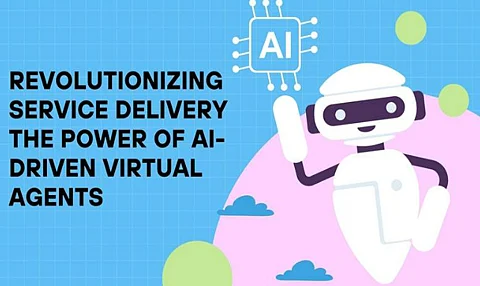

Artificial Intelligence in enterprise service management has come a long way in changing the interaction environment for employees and customers. Kamala Kannan Munusamy Ethirajan, an eminent researcher in the field, presents an overview of the service delivery role of AI-enabled virtual agents and their effect on IT, HR, and customer service functions. His research reveals the potential of these intelligent systems in transforming operational efficiency and user experience. These advances have set new standards for operational efficiency and intelligence, thus enabling organizations to operate competitively in a drastically digital environment.
Automating routine interactions and providing fast, efficient resolutions, AI-based virtual agents are changing the landscape of enterprise service management. Unlike conventional chatbots, modern virtual agents use NLU and machine learning to consider complex requests in a contextual manner. Besides faster response, the efforts result in a huge kit savings in operation by solving up to 60\% of the service requests without human intervention.
At the core of virtual agent technology is an advanced NLU engine that supports intent recognition and contextual processing. This elaborate system breaks the user query into parts, extracts the relevant information, and matches it up to suggested workflows such that accurate and relevant responses can be created. By continually learning from all past interactions, the virtual agents further enhance intention with the service delivered over time. Adaptive learning mechanisms enable these systems to dynamically change according to the new language patterns and user behavior.
A prime strength of AI-based virtual agents is their seamless integration within the enterprise's IT infrastructure. An advanced conversation flow manager enables these agents to retain context within multi-turn dialogues, allowing users to engage in complex interactions without being annoyed. In addition, robust integration layers allow virtual agents to interact with IT service management, human resource service delivery, and customer service management platforms, enhancing efficiency overall.
However, with the introduction of new technologies, repetitive tasks in the IT service management area, like resets, access requests, and troubleshooting, are getting taken over by virtual agents in redefining helpdesk operations. This has reportedly allowed organizations to reduce ticket volumes by as much as 50%, allowing IT personnel to work on more complex matters. Because automation improves businesses' abilities to expedite resolution times and reduce downtime, employee productivity is increased.
HR departments are also benefiting from virtual agent technology, with AI-driven assistants streamlining employee interactions. From answering queries on leave policies and benefits to assisting with onboarding processes, virtual agents are significantly improving employee experience. Studies indicate that organizations deploying AI-powered HR virtual assistants have seen higher engagement levels and a marked increase in operational efficiency.
Powering with AI automation, the customer service is one more field undergoing a transition. Virtual agents can now provide continuous support, delivering instant responses to simple queries and minimizing wait time. These agents also personalize interactions based on predictive analytics and sentiment analysis, raising customer satisfaction and earning loyalty to the brand. The categorization and routing of tickets automate support teams further and resolve issues faster.
The success of virtual agent implementations is measured using key performance indicators such as containment rates, resolution times, and customer satisfaction scores. Businesses leveraging AI in service automation have reported significant improvements, including a 50% reduction in tier 1 support costs and an 80% resolution rate for common inquiries. These metrics highlight the tangible benefits of AI in service delivery optimization.
On the increasing adoption of artificial intelligence-enabled automation, security and compliance would be the two imperatives for organizations. Virtual agents are built with very stringent access controls and encryption protocols for protection from exposure to sensitive information. When in compliance with regulatory requirement, enterprises can safely consolidate such AI into their services without any data security compromise.
The future of virtual-agent technology will be even more dynamic as advancements will be made in predictive analytics, emotional AI, and proactive service automation. AI-enabled virtual assistants will soon be able to identify user needs and propose solutions proactively-even before a problem presents itself. With the digital transformation in its full flow, AI will be instrumental in defining next-generation enterprise service management.
In summary, the impact of AI virtual agents on service delivery is reviewed, reinventing it, by Kamala Kannan Munusamy Ethirajan. Automation of mundane tasks, the faster turnaround of requests, and greater end-user satisfaction mark the transformation of enterprise business processes and the adoption of intelligent systems. Organizations that accept virtual agents will be in a much better position to operate effectively in an increasingly digital environment, as AI technology keeps advancing.
